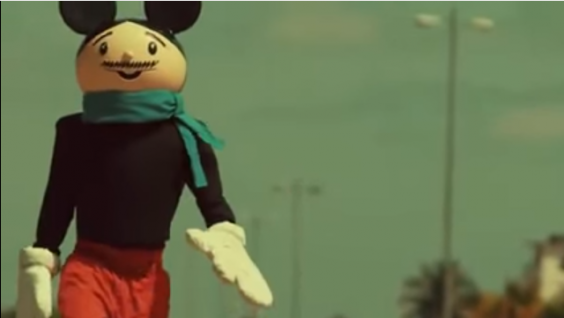Mickey Mouse versus Super Castro
by Orlando Luis Pardo Lazo translated by Alex Higson / January 28, 2016 / No comments

Raul Paz’s Mickey Mouse. Image via Youtube user: Anabel Perez
Due to a neoconservative and counterrevolutionary cartoon mouse, the official Lucas Awards ceremony was censored from Cuban state television.
At the end of November 2015 the official Lucas Awards ceremony took place in Cuba at the Karl Marx Theater in Havana. Since the late 1990s, the Lucas Awards have always been broadcast on Cuban television. The prizes are awarded for the production of the best Cuban music videos, as long as the videos have been broadcast by any of our four TV networks (all of which are State-run and, above and beyond that, are the “public” property of the Cuban Communist Party).

- Is it worth-while to focus on the last images and letters coming from the inside of the last living utopia on Earth? Is Cuba by now a contemporary country or just another old-fashioned delusion in the middle of Nowhere-America? A Cold-War Northtalgia maybe? Can we expect a young Rewwwolution.cu within that Ancien Régime still known as The Revolution? I would like to provoke more questions than answers.

- Orlando Luis Pardo Lazo was born in Havana City and still resides and resists there, working as a free-lance writer, photographer and blogger. He is the author of Boring Home (2009) and is the editor of the independent opinion and literary e-zine Voces.
On this occasion, Cuban viewers were eager to watch the 2015 edition of the awards. But then, with no explanation, which is just the way that Cuban institutions of all varieties do business—from culture to politics, on the island despotism and impunity reign supreme—the awards gala was simply never broadcast.
In addition, two months later the winners of the 2015 Lucas Awards still have not been published on the event’s official website nor on the so-called Cuban Wikipedia: EcuRed.
And why is that? Well, it looks like it is Mickey Mouse’s fault!
Yes, that neoconservative, counter-revolutionary little Yankee mouse. Who knows—in the upcoming US presidential elections Mickey may even vote for the Republican candidate with Cuban parents who is so feared in Cuba—Senator Marco Rubio.
At the 2015 Lucas Awards, one of the nominated music videos, from which a clip was shown during the ceremony, featured Mickey Mouse as something of a protagonist. The video in question is for “Hace falta” (I Wish) by singer Raúl Paz, a talented and multifaceted 45-year-old Cuban creative who produced and directed the video himself.
But in reality it wasn’t actually Mr. Mouse’s “meddling” presence that was the problem, but rather it was the fact that the person in the video with the mouse-like ears is none other than Colonel Elpidio Valdés, the archetypal pro-independence warrior and hero from Cuban cartoons and comic strips.
Except that now our “mambí” colonel is strolling around this new Havana that has diplomatic relations with the US dressed up like Mickey Mouse. And the warrior comes off as something of a pacifist, perhaps because the song is a love song that proclaims that he wants to “open the door” as “I wish that things would go our way”: “erase my memory,” “I wish the world would begin again, I wish my dreams would come true, I wish paths would change,” “turn everything around,” “and if I’m crazy I don’t care, because I want to be happy.”
A happy Havana. Brave New Havana.
And happiness in Cuba can only be conceived of as FIDELity to state concepts of the “Battle of Ideas” and the “War of All the People.” These two ludicrous ideas, more than just belonging to the state, are the best examples of the fascistoid thinking of Fidel Castro, a soldier who was never elected by the island’s citizens. He is a caudillo who has perhaps never enjoyed the witticisms of Walt Disney.
In fact, “Hace falta” didn’t even win an award at the 2015 Lucas Awards ceremony. However, perhaps as compensation to the artist, the Prize for Animation was awarded to another song by the prolific Raúl Paz, “No me digas que no” (Don’t Tell Me It’s Not), directed by Ermitis Blanco.
The rumors are truly ridiculous: they claim that this whole mediocre maelstrom was caused by a letter sent by the Presidency of the National Union of Writers and Artists of Cuba (UNEAC) to the Presidency of the Cuban Institute of Radio and Television (ICRT).
In this letter, whose original has not been publicly circulated, the UNEAC allegedly voices bitter criticisms of the non-ideological use of Cuban cartoons and icons, partly because they consider it to be an act of surrender to the consumerism to which their socialist society will very soon be exposed. Cubans are today very excited that US products have just started to arrive along with American tourists (that other kind of person-product, the raw materials of the clandestine industry of sexual promiscuity).
In any case, Cuban audiences have still not seen their Lucas Awards on national television. Popular slang on the island depicts Cuba’s transformation as “one step forward and two steps back,” in step with the more retrograde than rheumatic rhythm of a Revolution of octogenarians, by octogenarians, and for octogenarians. It is a grotesque gerontocracy with no sense of humor nor of human liberty.
Whether Cuba has 4 or 444 TV networks, I fear that so long as the Castros or descendants of the Castro clan hold power, we will have a long and drawn-out wait for a non-fossilized future.




